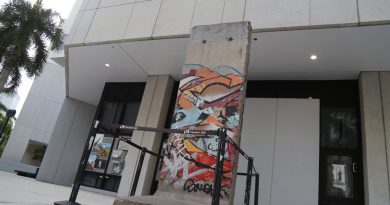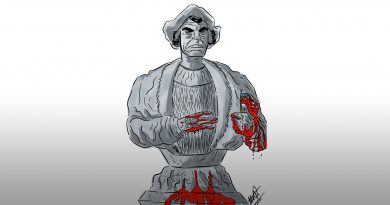A Need For A Thanksgiving History Lesson
On Nov. 27, Americans will gather around the dinner table and give thanks to their god for blessing them with a bountiful meal and life.
According to Paul George, an American History professor at Wolfson Campus, the Pilgrims arrived at Plymouth with hopeful ambitions for their new lives. In Holland, they anticipated their journey to the new and unknown world. During their time on the Mayflower in the Atlantic Ocean, they endured harsh weather and dreadful living conditions. For them, the arrival at Plymouth was the culmination of many years of hard-work, determination, and persistence, making this day of grace exceptionally significant in their lives.
Religion played a key role in the development of the New World. Many colonists ventured off and settled in modern-day America to escape the religious persecution they suffered in Europe. Their religious beliefs, and the discipline and expectations that came along with them, resulted in fruitful colonies.
From the colonists’ point of view, Thanksgiving represented a celebration of their tremendous efforts, and symbolized their sense of gratitude to begin anew in the New World with the prospect of personal and religious liberty.
Nowadays, the holiday is often understood and taught through the Pilgrim’s perspective of history, when in reality there exists another perspective as well.
For the Native Americans, the celebration of Thanksgiving holds quite a different sentiment.
In grade schools throughout the country, Thanksgiving is often characterized by the likes of turkeys and Indians wearing animal skin clothing and colorful feathers on their head. This unfortunate generalization of the Native American role in Thanksgiving is consistently propagated to most Americans. To a certain extent, it trivializes an important group of people in United States history and misinforms individuals on the true nature of Thanksgiving, creating the foundation for future prejudice.
This is not to advocate for the banning of the holiday as a whole, but rather an attempt to reeducate individuals, and draw attention to the positive and negative aspects of the holiday.
Many Americans fervently believe that Thanksgiving is a holiday that commemorates the bringing together of two distinctive cultures, but are likely not conscious of the bias that has unfortunately affected this holiday.
In a conversation I had with George, he described Thanksgiving as a non-starter. The gratitude expressed by the colonists had nothing to do with the Native Americans, in fact it served as a catalyst for the displacement, disease, and eventually, death. It could be argued that the first Thanksgiving, with its good intentions, justified their stay and made it permanent. The repercussions of the event eventually dwindled their populations, ultimately disrupting a beautiful culture with the imposition of their beliefs, customs, and supposed “supremacy.”
Although it is impossible to change everything that has been taught in the past and alter the current curriculum for schools all over the nation, MDC students can begin to take action by familiarizing themselves with the actual historical incident of the holiday.
While it is difficult to perfectly challenge misleading representations that pervade throughout our schools, families, and social circles, students can start by encouraging diversity, knowledge, and comprehension of both sides of the story.
Our world is constantly becoming more and more diverse. A person’s identity and values make them who they are. If we, as responsible citizens, do not take it upon ourselves to recognize the animosity and injustice that the Native Americans suffered during colonization, then we are taking part in the prejudice people are attempting to alter.
The one-sidedness of American history regarding Thanksgiving is troubling. We cannot be silent and refuse to understand both sides of the story. If students choose to turn their heads away from the history that was not revealed to them, then they are breeding intolerance and therefore prolonging the fact that the Native American story has been conveniently discarded in history books.
It is time to think of Thanksgiving as something more than a day where we can say grace, though that aspect of it is certainly beautiful. However, we must seek to achieve full equality in society and the first steps to attaining that justice would be to give all the pieces of the puzzles in order to create the bigger picture. Education will lead to a better understanding of the holiday and what it essentially means to various groups in society, not just one.




